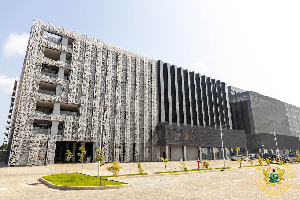Accra, 26 Jan. '99 -
Nana Akuoko Sarpong, Chairman for the National Commission on Culture (NCC), today called on African countries to make use of their culture to enrich their political institutions and practices.
"The concept of culture as a political priority enables us to explore its participatory nature. Traditional culture allows for participation in events and processes by all at appropriate levels through clear distribution of roles" , he said.
Nana Akuoko Sarpong was opening a two-day regional seminar on the application of UNESCO recommendations on " safe-guarding traditional culture and folklore in African countries" in Accra. Thirty experts from 20 countries are attending the conference organised by UNESCO.
Nana Akuoko Sarpong said the African indigenous concept of doing things, carrying its heritage to influence policy crafting and actions could give policy a unique and authentic African richness.
Nana Akuoko Sarpong said Africa's history shows that the struggle for independence was initiated by traditional rulers.
"The chiefs saw themselves rightly as the only rallying points to take the counter political decisions to demand rights from the colonialists.
"Their actions were political in traditional garb and the support from the people was based on the allegiances which recognised chiefs as their heads culturally, ascending into political leadership".
He said Ghana, in her bid to exploit her cultural diversity to promote a national sense of unity, has strengthened the role of traditional rulers and established a commission which reaches out to all cultural bases.
Nana Akuoko Sarpong said the protection of culture and tradition should not favour the business minded people else the original culture will be diluted.
Madame Noriki Aikawa, UNESCO Heritage officer, said the organisation is deeply involved in the preservation of African traditions and cultures because it sees the cultural reformation of the continent as an important undertaking. "Diversity in a global cultural mixing is a prerequisite for international peace and advancement."
General News of Tuesday, 26 January 1999
Source: --












